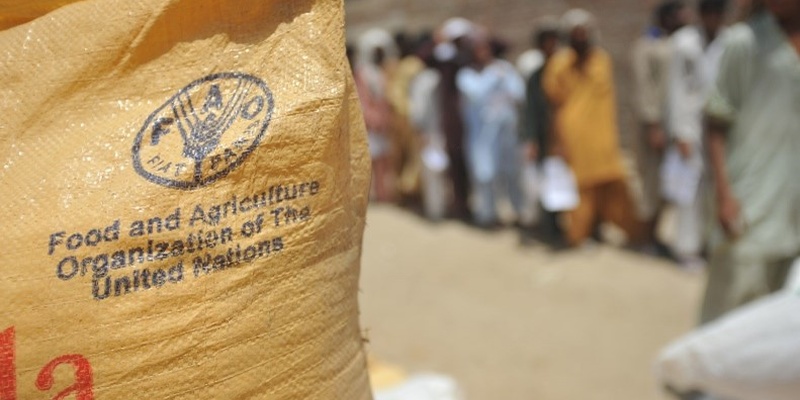BLOG: Plant health standards and the safe delivery of food and humanitarian aid
Posted on Sat, 05 Aug 2023, 10:52

© FAO/Farooq Naeem
By Leisongi Bulesulu and Sophie Peterson
Chair and vice chair, respectively, of the CPM Focus group on the Safe Provision of Food and Other Humanitarian Aid
Delivering humanitarian aid is a noble cause and the International Plant Protection Convention (IPPC) is committed to working with all parties to ensure the uninterrupted movement of agricultural products. Transporting agricultural products, however, could present phytosanitary risks by serving as a pathway for plant pests. In crisis situations, regardless of the cause, affected countries can be temporarily constrained in their ability to implement their phytosanitary responsibilities.
During emergencies, countries experiencing crises often have difficulty meeting their obligations under the IPPC. Countries providing aid often do have this capacity but their ability to “reduce the gap” are affected by the complex and sometimes unknown pathways which emergency aid might take enroute to countries and peoples in crisis. Additionally, the timing, location and scale of these crises are inherently variable. Countries with and without land borders face risks that vary and require attention when considering solutions to this issue. The IPPC community, thus, recognizes that more robust international cooperation is needed to prevent the global spread of pests through the transport of humanitarian aid.
Different regions suffer from both natural and human-induced disasters and crises. The South-West Pacific is a region extremely vulnerable to the impacts of climate change and the increased severity and frequency of natural disasters like cyclones. During the 2019 IPPC Call for Topics, the South-West Pacific region, with support of many others, proposed that the IPPC address the issue of safe provision of aid. Through this process, the recommendation of the Commission on Phytosanitary Measures (CPM) on Safe Aid was developed and adopted. The recommendation includes among others, for IPPC contracting parties to engage with relevant stakeholders such as aid agencies, exporters, importers and regulators to raise awareness on the pest risk associated with humanitarian aid.
The South-West Pacific region submitted this topic again during the 2021 IPPC Call for Topics to further support the CPM recommendation. The aim was to provide the mechanisms which donor and recipient countries consider as needed to support movement of aid while reducing potential pest spread. In response, the CPM established the Focus Group on the Safe provision of Food and Other Humanitarian Aid.
Among the focus group's discussions is the need for better understanding and coordination of an approach to providing safe aid. While we recognize that the issue is very complex, solutions can be made to accommodate several types of situations globally.
As a start, we have addressed the group’s Terms of Reference and developed a specification for a proposed international standard to support safe provision of aid. We have also drafted a diagram from a phytosanitary perspective to depict the complex route that humanitarian aid takes around the globe. This diagram will be refined over the coming months with the help of our fellow focus group members including those from the World Food Programme. A webinar promoting the CPM recommendation and advocating involvement in addressing this topic has also been proposed.
Through our work and with enhanced collaboration, awareness and discussion of this multifaceted issue, the focus group aims to provide a proposal at the eighteenth session of the CPM in 2024 on the way forward for the IPPC. Through discussion, advocacy and iterative addition of tools over time, the potential risks posed by this pathway will be better addressed and countries affected by these crisis situations will be made more resilient.
Find more information on the CPM Focus Group on the Safe Provisions of Food and other Humanitarian Aid here.

